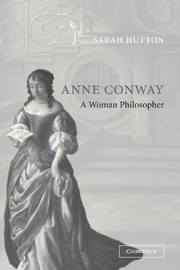Book contents
- Frontmatter
- Contents
- Acknowledgements
- Introduction
- 1 Anne Finch, Viscountess Conway
- 2 A philosophical education
- 3 Religion and Anne Conway
- 4 Anne Conway and Henry More
- 5 John Finch, Thomas Hobbes and Margaret Cavendish
- 6 Experimental physick: Boyle, Greatrakes, Stubbe
- 7 Physic and philosophy: Van Helmont, father and son
- 8 Kabbalistical dialogues
- 9 Quakerism and George Keith
- 10 Last years
- 11 Legacy
- Bibliography
- Index
11 - Legacy
Published online by Cambridge University Press: 22 September 2009
- Frontmatter
- Contents
- Acknowledgements
- Introduction
- 1 Anne Finch, Viscountess Conway
- 2 A philosophical education
- 3 Religion and Anne Conway
- 4 Anne Conway and Henry More
- 5 John Finch, Thomas Hobbes and Margaret Cavendish
- 6 Experimental physick: Boyle, Greatrakes, Stubbe
- 7 Physic and philosophy: Van Helmont, father and son
- 8 Kabbalistical dialogues
- 9 Quakerism and George Keith
- 10 Last years
- 11 Legacy
- Bibliography
- Index
Summary
‘l'histoire de cette Dame extraordinaire’
The anonymous manuscript treatise that lay unpublished among Anne Conway's papers was the culmination of a lifetime's interest in philosophy. In its final form, it was most probably produced no more than a couple of years before she died. But it is the outcome of on-going philosophical discussions which, as we have seen, may be traced back to her earliest study of philosophy. Her youthful doubt as to whether philosophy and religion are compatible opened the way to central questions about the nature of God, the world, and God's relation to the world – questions she tackled using the philosophical tools of Platonism and Cartesianism, and in the light of her study of contemporary natural philosophy. Central to her investigations were the issues of how material reality can be produced by an immaterial God, and how the existence of pain and suffering can be reconciled with the perfection of God. The ‘paper book’ Van Helmont found among her papers contained the answers to these questions in the form of a synthesis which explains the nature of the world through its causes. The resulting Principles is both a philosophy of nature and a philosophy of religion, a cosmology and a theodicy, in which the ultimate origin of all things is God.
The centrality of God is not unusual in seventeenth-century philosophy, but for Anne Conway what matters is not simply the existence of God, but the nature of God, because her system is founded on an analogy between God and the created world.
- Type
- Chapter
- Information
- Anne ConwayA Woman Philosopher, pp. 220 - 243Publisher: Cambridge University PressPrint publication year: 2004



